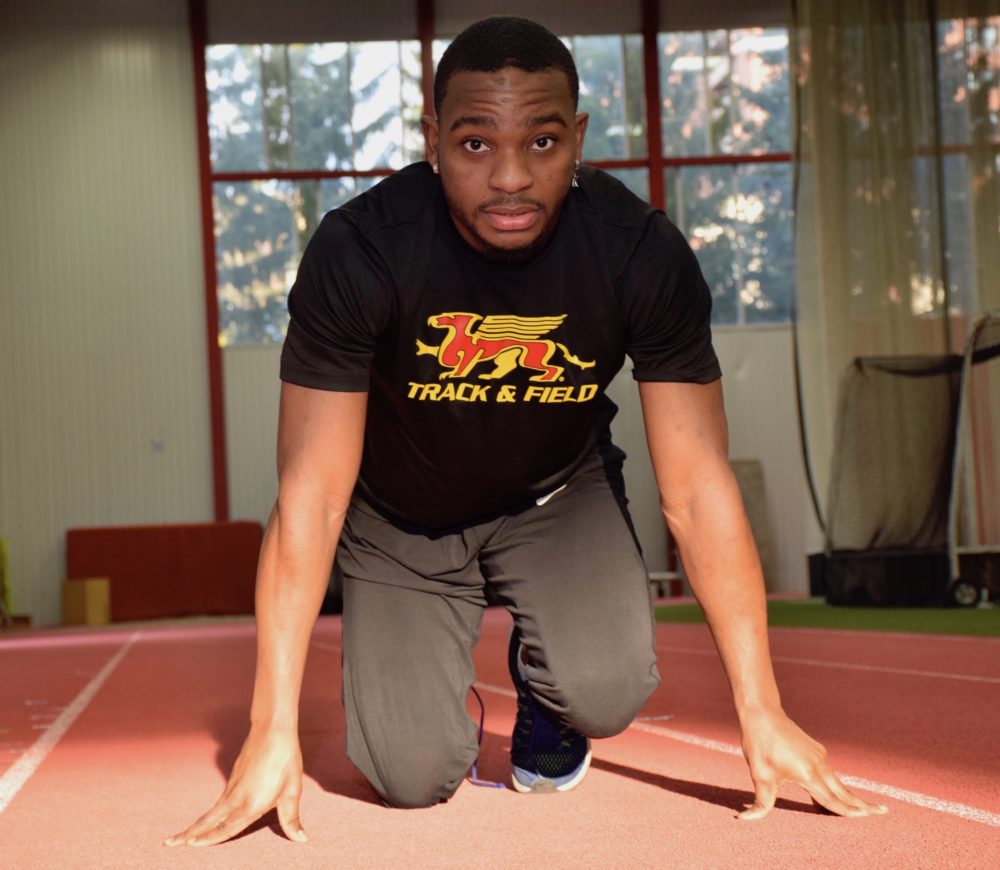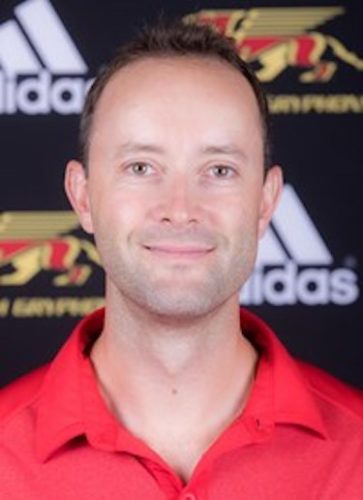
They call him Kuda.
A new member of the University of Guelph’s track and field team, Kudakwashe Murasiranwa, 21, has journeyed far to be a Gryphon athlete. Saturday he will compete in his first Ontario University Athletics (OUA) track and field championships.
If his prowess as a sprinter is apparent, so are his depth and strength of character, says his coach.
Born in Zimbabwe during great turmoil in the African nation, Murasiranwa was separated from his parents as a small child, a separation that unexpectedly lasted more than 10 years and spanned some 15,000 kilometres. Learning to live without his parents made him tough and determined, he said. The family reunited in Edmonton only in 2014, a happy ending to a story fraught with uncertainty.
“When I was young, it was very challenging,” Kuda said. “I didn’t grow up with my parents around. It was just my little brother and I, so we didn’t have those parental figures in our lives.”
His natural talent for athletics and his capacity to push himself to improve played a major role in the development of his inner strength and his resilience and independence.
Political and economic chaos in Zimbabwe drove apart the Murasiranwa family at the beginning of the 2000s. Conditions in the country had deteriorated rapidly due to failed monetary policies, a ruinous land seizure program and government-led violence against civilians. The inflation rate was astronomical and unemployment rampant. There was a mass exodus under way when Kuda was a small boy.
His parents, he said, wanted a more secure and prosperous life for the family, one less encumbered by the struggle for survival and free from the threat of violence. But the path to that life was far from easy. North America was not the land of opportunity his parents hoped it would be, at least not immediately.
His father, Armstrong, went ahead of his pregnant wife, Emillia, and son, Kuda, a toddler at the time. A boilermaker by trade, Armstrong landed in North America seeking refugee status and with high hopes of finding a good job. But he encountered barriers to securing both steady work and immigration papers. His son Darlington was born in his absence. It would be 13 years before the father saw his second-born child for the first time.

In his first two competitions as a Gryphon sprinter, Murasiranwa won both of his 60-metre races, reaching a personal best of 6.90 seconds in one of those late-November indoor events. The American running phenom Christian Coleman holds the world record in the event, at 6.34 seconds.
“I feel really good,” Murasiranwa said, sitting on a wooden bench in an athletics centre hallway, dressed in his Gryphon attire before a late-afternoon training session. The training regimen, he said, is intense and challenging, just the way he likes it. With each session he feels stronger, leaner and capable of greater speed.
Speaking of his recent races, he said, “I wasn’t really expecting to win or to get a personal best. I thought it was too early in the season to run that fast.”
While he excelled at football in high school and could probably star in the sport at the University, he said he will focus on sprinting during his time at U of G. His goal is to qualify for the 2020 Olympic Games in Tokyo.
“I’ve set goals for myself that I really want to accomplish,” he said. “I’ll keep training hard and working hard at academics and hopefully I’ll do well in the next two or three years. I feel good around here. It’s like a family.”
In 2015, U of G sprinting coach Jason Kerr became a fan of Murasiranwa and an instant believer in his gifts. Kerr, himself a sprinter, began recruiting the Zimbabwean soon after hearing a lot of chatter about him in national track and field circles. Kuda was living in Edmonton at the time.
“In track, you kind of know who’s got a gift based on who is in the top of the rankings,” Kerr said. “Kuda was interesting because he went from a total unknown to being someone in the rankings.”

Kerr saw something special in the young man, and not just in his athletic physique. Pictures of him clearly showed he was built for speed, with a quintessential sprinter’s body. But there was something much deeper, something in Kuda’s story – his humble origins, his difficult childhood and challenging path – that set him apart and at the same time made him a great fit for U of G, Kerr said.
“Right away you learn that this is a guy who is a stable, every-day-always-there kind of guy,” Kerr said. “No matter how much chaos is around him, he finds a way to keep everything together. He’s like a rock. He’s a very spiritual kid and very driven through that. That creates a platform for him that is very stable. He’s the kind of person who is not going to falter in a crazy, high-performance environment. For him, that’s just another day.”
Murasiranwa wanted to come to U of G right away, but took the community college route first to boost his grades, attending Southwestern Oregon Community College in 2017 and part of 2018. Naturally, he starred in track.
Kerr assumed the sprinter would stay in the U.S., but U of G and Canada pulled at Kuda’s heart.
“I really wanted to go to Guelph,” he said. “Jason was always there for me and believed in me. And U of G had the best track program in Canada.”
Shortly after he arrived in Guelph last summer, Murasiranwa took to the track for some light workouts and to familiarize himself with his new surroundings, Kerr said.
“If you spend enough time around elite athletes, you get a feeling for those who have something extra, something a little bit different,” he said. “He hadn’t been training in a while. He was a little bit out of shape. I was standing with two national team guys on the sidelines, and Kuda did one acceleration as he went by. We all looked at each other and said, ‘Yeah, that guy’s not normal.’ He is a powerful guy.”

In 2003, Kuda’s mother, Emillia, decided to join her husband in the U.S., seeing it as a way to hasten the resettlement process. But since she was unable to get a visa that allowed her children to come with her, the mother left her sons with their grandmothers, believing it to be a temporary arrangement. Immigration barriers lingered, and time passed. The process of securing refugee status would be jeopardized if both parents left the U.S.
The boys were eventually moved to South Africa to live with their half-siblings, as violence and starvation spread in Zimbabwe. Years passed. In 2010, their half-brother Armstrong Jr., just 21, died of pneumonia. The parents, now in Canada and still without immigration papers, could not attend his funeral.
“From where I am right now, I can appreciate it because it made me the person who I am,” the sprinter said. “It made me stronger. I understand why they did it – for a better life.”
As Kuda and his brother, Darlington, grew up, their exceptional athletic abilities emerged. When they were finally able to join their parents in Edmonton in 2014, both immediately caught the attention of high school and post-secondary recruiters and coaches. The two boys excelled at football, soccer and track. Darlington eventually went to Vancouver on a soccer residency.
In news reports, Kuda’s high school coaches described him as someone with an extraordinary work ethic and awesome speed — a competitor who thrived on the rigours of training and the energy of competition. Those capacities have only grown since he arrived at U of G, Kerr said.
Armstrong and Emillia Murasiranwa now live in Kamloops, B.C. Armstrong works in Fort McMurray, Alta., on a week-on/week-off basis, while Emillia is a support worker at a retirement home. They are Canadian citizens.
“I talk to them every day,” said Kuda. “They’re working very hard. They miss me a lot.”
Kerr’s highest hope for his young sprinter is that he gets a good education. Pursuing a major in criminal justice, Murasiranwa wants to work as an immigration or police officer.
“I think he is going to be a very influential member of community groups in the future,” said Kerr. “There’s a lot going on under the surface with him. On the athletic side, the number one goal is for him to stay healthy and enjoy a full season, before we talk about elite or performance-based goals. I want him to enjoy the experience.”
Murasiranwa has navigated through a lot of hardship and struggle in his life, Kerr added, and the young man’s feelings run deep. All that he has gone through has given him meaning, purpose and a cause.
“When you combine his faith and his life experiences, it writes a pretty poetic story,” Kerr said. “I think he is driven by a much stronger force.”
Kuda is happy – happy with the athletic gifts he has, happy with the home he has found at U of G. And he appreciates the struggles he went through and strength he gained from them.
“It taught me not to give up easily and to work hard,” he said. “I always find a way to get through something, find a reason to work through it. I find a higher purpose in everything.”